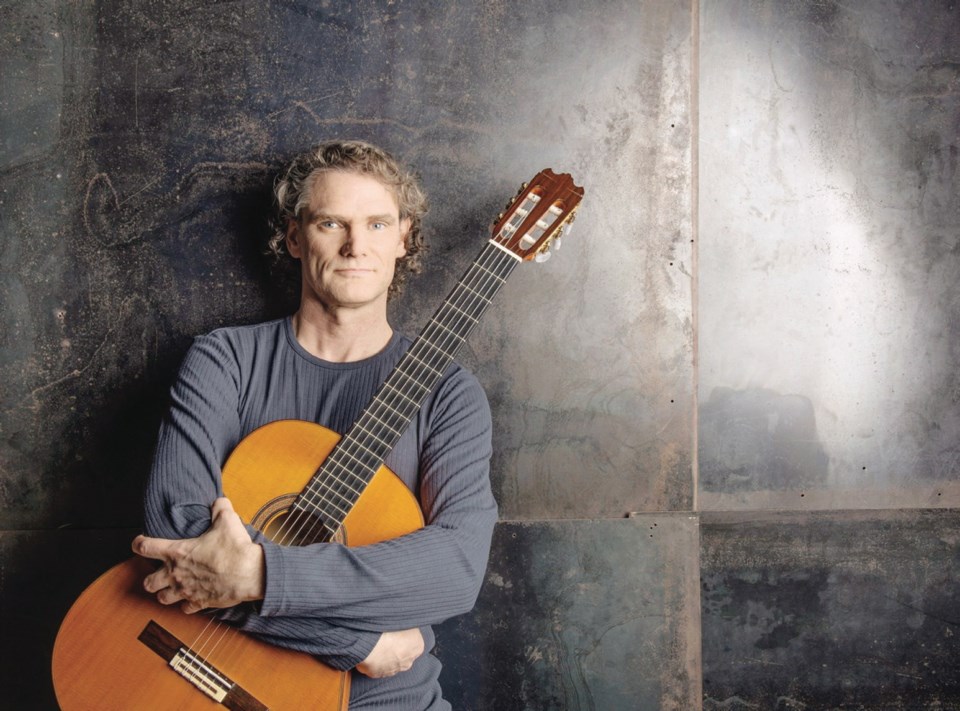What: Jesse Cook
When: Friday, 7:30 p.m.
Where: Royal Theatre
Tickets: $63 at rmts.bc.ca, 250-386-6121, or in person at the Royal McPherson box office
The musical direction of each album by Jesse Cook is not entirely of his own choosing. While rehearsing, he lets one musical style naturally take precedence over another. When the battle is won, that is the path he will follow in the studio.
“There’s no strategy,” Cook said with a laugh. “If I like it, I keep it. If I don’t, it goes. It’s like musical Darwinism. You go with whatever sounds best.”
The downside is that many stones are left unturned, Cook said. For years, the Paris-born, Toronto-based flamenco guitarist has wanted to explore a few pet projects — a duets record, in addition to albums of Indian and Brazilian music — but they always manage to take a back seat to other impulses.
Cook has come up with some fantastic scenarios along the way. In 2003, he travelled to Cairo and worked with Egyptian musicians for the album Nomad. For his 2009 effort, The Rumba Foundation, he journeyed to Colombia and mixed traditional vallenato folk musicians into the fold. The story behind his new album, One World, is less dramatic, but the results are equally interesting.
“It’s very easy to fall into patterns and habits. By putting myself in a different situation, I’m hoping that something will spark.”
On his new record, that spark was his son, who was seven at the time One World was recorded.
Cook, who produces himself in a studio at his Toronto home, stumbled upon a more electronic direction on One World, thanks to his son’s influence. Cook credits the youngster for bringing to light the computer software in his home studio, though the experiment didn’t come without some stressful moments for the elder Cook.
“The last thing I wanted was a seven-year-old running amok with all that gear. But he’s very persistent and I eventually relented. I couldn’t watch. I had to leave the room.
“I came back and he had pressed some buttons and it was very exciting. I had been using that program for years and I didn’t even know it could do that.”
In the months that followed, Cook dug deeper into the computer software and emerged with something of a new sound — an electronic-accented album of flamenco guitar fireworks, built upon loops and digital drum patterns constructed by Cook in his studio. While there is more of a modern feel to the record, One World still sounds like Cook at its core.
The new approach will give some longtime listeners the impression he soaks up all types of music, but Cook said that is not the case.
“That’s a bit of a weakness for me. I don’t fall in love with music as much as I’d like to. When I do fall in love with an album, I’ll play it forever. But it takes a long time for something to really connect with me.”
He is most often lumped together with other flamenco musicians, given his impressive credentials. In 2008, he placed second behind Paco de Lucia — the Spanish virtuoso — in Acoustic Guitar magazine’s Players’ Choice Awards.
With more than 40 years experience on the guitar, and schooling at the Eli Kassner Guitar Academy, the Royal Conservatory of Music in Toronto and Boston’s Berklee College of Music, there is no doubting his talent. Or his success, with more than one million copies of his recordings sold.
But ever since the release of his debut, 1995’s Tempest, Cook has struggled with the flamenco label. The 11-time Juno Award nominee is a titan in the world music community, both at home and abroad. But he never thought that he could compete with the true flamenco traditionalists — nor did he ever want to.
“Certainly, there’s an element of flamenco in what I do, but it’s not flamenco music. Within flamenco circles, that probably hurts [my chances], but in some ways it helps me in that there are a lot of great flamenco guitarists.
“If you go to Spain, the level of playing is ridiculous. Fantastic, fantastic players, and those are just the ones we know. I’ve been to Spain and there are guys at the end of your block who will blow your mind.”
Does he worry what fans will think of his new sound, or his move to distance himself from what listeners might think is traditional flamenco? Certainly not.
“I’m not of that culture, so it’s not my job to be the flagbearer and hold up the torch for flamenco. And that gives me freedom to do whatever I want, break the rules and do something new, which I think means that I sound like nobody else. And that, I think, is the biggest reason I’m still here. I’m not competing with 20 other guys.”
He is happy to occupy the middle ground. Not fitting in with one stylistic community enables Cook to float freely between various styles and genres, as evidenced by the recent run of One World, which hit No. 1 on both the jazz and world music charts upon its release.
“The industry has these set boxes and I’ve always been the square peg looking at a bunch of round holes, trying to find the hole for my music. And I keep changing, so there is no real slot.”



